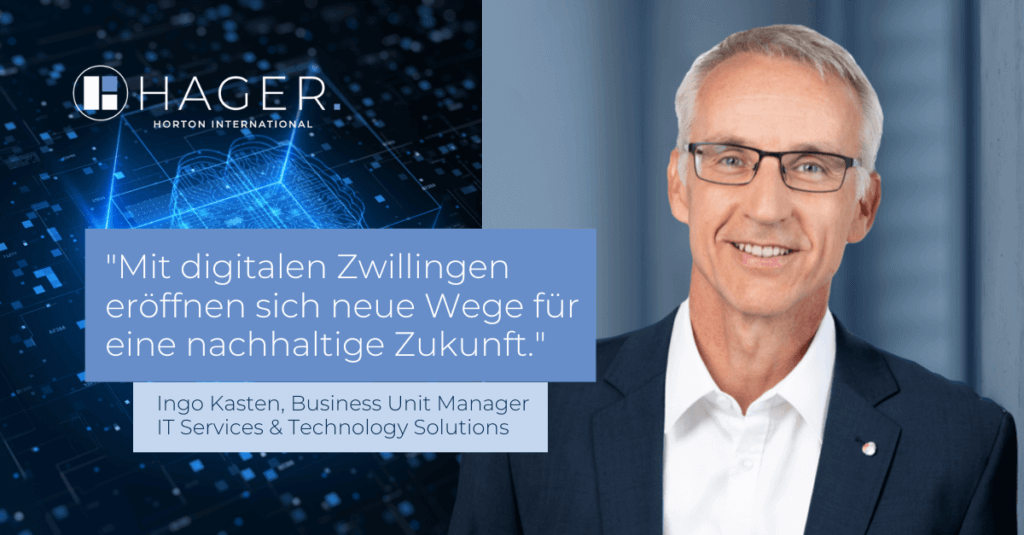
Sustainability and compliance as a strategic decision
Companies still tend to see sustainability goals as a cost driver and often question the added value. However, sustainability only becomes expensive when you cut corners. There is a risk of expensive crashes if products or individual components veer towards child labour or critical CO2 emissions. Scandals, sanctions and permanent damage to public image are then usually the result. Against this backdrop, the environmentally friendly and responsible image that companies and corporations communicate about themselves is being increasingly scrutinised. Consumers and competitors do not forget whitewashing of carbon footprints and false information about supposedly fair products.
SMART DOPPELGANGERS REDUCE RISKS
Digital twins have their moment in effective – and proactive – sustainability risk management. They represent the entire cycle virtually – for example by visualising the processes in a manufacturing plant or production line – and can draw conclusions from (sensor) real-time data and through simulation that contribute to decision-making in the real world of the company. As smart ‘doppelgangers’, they facilitate traceability in the supply chain and for products (for example in the event of contamination). They categorise overdue obligations as a risk, which means that damage and legal risks can be averted. This exact virtual mapping and traceability already plays a major role in the trade and production of food, pharmaceuticals and supplier parts for car production in particular. More and more industries are benefiting from customised digital twins when it comes to fail-safe work and active processes. They are the ‘crash test dummy’ for all possible scenarios.
SUSTAINABILITY HAS RELEVANCE FOR SALES
Sustainable products and services are no longer a niche today. Despite reservations that still exist, sustainability is already making a significant contribution to sales in most sectors and companies – in other words, sustainability pays off. For developing and manufacturing companies in particular, this represents an economic lever that must not go unutilised. Holistic sustainability – credible sustainability communication is part of this – has become a competitive factor. A good and stable sustainability image as well as practised sustainability in terms of resource conservation and social responsibility have a positive impact on traditional economic indicators.
‘CLEAN’ SHOPPING
The trick lies in the detail: Products that companies use themselves can also be tricky. Some people may wonder whether the many headsets in the office were really manufactured abroad in a climate-neutral way and in accordance with the company’s compliance policy, which is strictly committed to environmental protection. Goods, services, rights – companies follow many voluntary compliance guidelines in their procurement, including more animal welfare and fair trade certificates. Transparent supply and production chains, suppliers with integrity: ‘Clean’ purchasing is based on responsibility and due diligence. If omissions and errors are discovered in retrospect, a loss of face in the media (‘shitstorm’) is often only the lesser of two evils.
RISK PROPHYLAXIS AT THE TOUCH OF A BUTTON
Back to production. Here, digital twins permanently monitor sustainability targets. Immature products and contestable production steps in the factory, the real cost drivers, can be identified or ‘predicted’ with the digital tool. Simulated stress tests can also be used to check the resilience of the supply chain. As a result, digital twins make supply chains more resilient. For example, what is the impact of the temporary failure of a central component whose paintwork no longer meets the stricter EU eco-standards? The digital twin, the recognised instrument for risk prevention and more efficient management, then runs through alternative options for action in good time at the touch of a button.
BEST FRIENDS
The environmental concept, which goes far beyond the legal requirements, and compliance are often, but not necessarily, congruent. Sustainability and compliance are pretty much best friends, but they are not twins. However, sustainability would hardly be credible without compliance and vice versa. Digital twins, which connect the real world with the virtual world, can ensure supply chain and energy supply compliance (green electricity!) – and in turn they can optimise CO2 foodprint sustainability throughout the entire life cycle; their high potential for sustainability assessment speaks for itself. Digital twins are able to bring the two together, especially where the scales are not balanced, such as wholesale companies and application companies with their stronger focus on compliance.
CONCLUSION: STRONG ON THIN ICE
Digital twins see ‘everything’ – knowledgeable teams see more in total. The human factor remains decisive in the end. In concrete terms, this should prompt companies to set up multifunctional teams in which production and logistics specialists, lawyers and, if necessary, chemists pool their respective expertise in addition to modelling customised architectures for digital twins (including digital factories) and other simulation tools. Experience proves the advantages: All knowledge relevant to ecological, ethical safety and legal compliance can be effectively bundled. In the end, the results of such interdisciplinary teams are more profitable than most companies can imagine. Those who do not invest in them run the risk of acting too late in an emergency. The image of the responsible company is becoming increasingly complex and therefore more vulnerable. An identified toxic dye here, a previously overlooked dark link in the supply chain there: experts from different disciplines must then immediately engage in a practised team exchange on the ‘thin ice’ and initiate measures. There is no time to lose. Real or alleged misconduct is immediately publicised and, depending on the prominence of the company, duplicated millions of times over. Even the best communication strategy is then usually powerless.
‘Sustainability, efficiency and resilience do not have to be conflicting goals.’
Ingo Kasten, HAGER Executive Consulting, IT Services and Technology Solutions
Ingo Kasten, Business Unit Manager IT Services and Technology Solutions at HAGER Executive Consulting in Frankfurt/M. In particular, he identifies ‘modern IT heads’ for the digital transformation and Industry 4.0.

